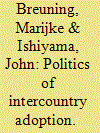| Srl | Item |
| 1 |
ID:
090679


|
|
|
|
|
| Publication |
2009.
|
| Summary/Abstract |
What determines whether a country has more or less restrictive policies regarding intercountry adoption? Despite the growing importance of intercountry adoption as a political issue, and as an explicitly human face of globalization, there is virtually no systematic empirical work on intercountry adoption. We introduce a measure of the restrictiveness of the adoption laws in Sub-Saharan African countries and test possible explanations for the variations in legal restrictions on intercountry adoption among these countries.
Factors that are commonly cited as explanations for the restrictiveness of intercountry adoption policies do not hold up very well in our assessment. Openness to adoption is not determined by the severity of the orphan crisis or the AIDS crisis within the sending country, nor are democratic countries more responsive to the needs of their orphans. Additionally, African signatories to the Hague Convention, which aimed to increase transparency and accountability in intercountry adoption, tend to be among the most restrictive. On the other hand, a stronger connection with the global economy is associated with greater openness to intercountry adoption. We conclude with a discussion of the implications for orphans and for intercountry adoption.
|
|
|
|
|
|
|
|
|
|
|
|
|
|
|
|
| 2 |
ID:
171778


|
|
|
|
|
| Summary/Abstract |
States often play multiple roles on the world stage, which need not fit together coherently. Moreover, foreign policy roles may be dissonant with one another: auxiliary roles may detract from the state's master role or status. What prompts decision makers to address role dissonance and role conflict?
Building on earlier role theory research, we develop a framework that theorizes when and how role dissonance turns into conflict between a state's master and auxiliary foreign policy roles. We theorize that role conflict may be addressed through modification rather than abandonment of an auxiliary role.
The theory is illustrated with a case study that traces Russia's attempt to reconcile dissonance between its major-power role and its auxiliary role as a sending country (in intercountry adoption). We show that the interplay between master and auxiliary roles is complex. States care about status but also address dissonant auxiliary roles and role conflict pragmatically.
|
|
|
|
|
|
|
|
|
|
|
|
|
|
|
|
| 3 |
ID:
126698


|
|
|
|
|
| Publication |
2013.
|
| Summary/Abstract |
Critics of intercountry adoption define it as a demand-driven market for babies, from which parents in rich countries benefit at the expense of those in poor countries. Advocates hold that it often provides the best chance for orphaned children to grow up in a family. This paper investigates these opposing claims. It develops a theory that outlines the circumstances under which intercountry adoption is likely to result in a "baby trade," and evaluates expectations derived from that theory on the basis of data on adoptions to the United States. The findings suggest that sending countries with large and fast-growing adoption programs may be particularly vulnerable to the temptation to supply a demand-driven market. However, sending countries do not simply respond to international incentives. Instead, the variation in participation in intercountry adoption between sending countries is partially driven by domestic incentives. The paper ends with suggestions for future research and policy.
|
|
|
|
|
|
|
|
|
|
|
|
|
|
|
|